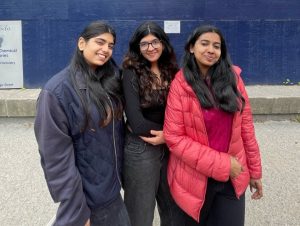
The team was the result of one dinner at 7PM that became a habit. Making the finals of the National Case Competition was the second result of that habit. The most important result is the remarkable friendship created by three economics undergrads affiliated with Trinity College. Aditi Gupta, Natalia George, and Diya Chandna are all international students from India who chose to study at the University of Toronto.
“Natalia and I became friends in our first-year economics class,” Diya remembered. “I just asked her what college she was from, and when she said Trinity, I invited her to dinner. That small moment turned into a tradition. We ate dinner together every night at seven for two years.”
Aditi joined their table after learning her childhood friend was in Toronto too.
“Diya and I go way back—we’ve known each other since middle school,” Aditi explained. “We lost touch for a few years, and then suddenly we found out we were in the same college, doing the same program. It felt like everything came full circle.”
Entering the National Case Competition as a team was a last-minute decision. None of the trio had competed before. Case competitions present teams of competitors with a business issue to solve in the same way consultants working in the field might. The teams then document and present their solutions before a panel of judges who typically work in consulting.
“The competition was held virtually on May 30th and 31st, and we had less than 24 hours to read the case, brainstorm, and prepare our presentation,” Aditi remembered, “We were all in different time zones, so we had to coordinate carefully. We each read the case individually first, then came together to brainstorm and build our strategy.”
The scenario? To create a business plan for a sustainable coffee shop. While it might not seem like a natural fit for three students from a tea-forward culture, they found they had plenty of inspiration to draw on from their upbringing.
“Every time I spend time with my grandparents in India, I notice how little waste they produce. They’ll bring things home wrapped in newspaper or banana leaves—no plastic. It’s such a contrast to life in Canada,” said Diya. “It’s not just about habits; it’s about the entire system being more sustainable by default. That perspective influenced how we approached the case.”
Economics students must learn to apply concepts from coursework to real life. The case competition gave the trio exactly that opportunity.
“Even though it was our first case competition, we treated it like a real consulting challenge. We focused on the consumer, built a strong narrative, and made sure our ideas were actionable and grounded in research,” Natalia said.

The chemistry the friends created also played a role.
“We ended the presentation on an emotional note, saying we were brewing community, not just coffee,” Aditi added. “That message really resonated with the judges.”
The undergraduate team believes others can learn from their case competition experience, but the most important lesson comes not from how they performed in the competition, but in how they created their team beginning in ECO101.
“My advice to new students is, don’t be afraid to make the first move. Chances are the person next to you in class is just as nervous. That one dinner invitation from Diya turned into a friendship that has now lasted years,” Natalia said.
Return to the Department of Economics website.
Scroll more news.
